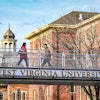 Soccer icon and humanitarian Sheyi Emmanuel Adebayor with Morgan State University President Dr. David K. Wilson
Soccer icon and humanitarian Sheyi Emmanuel Adebayor with Morgan State University President Dr. David K. Wilson
The SEA Foundation, founded by internationally acclaimed soccer icon and humanitarian Sheyi Emmanuel Adebayor, brings a unique philanthropic vision to this partnership. Based in Lomé, Togo, the nonprofit organization has established itself as a driving force for community empowerment through education, population health, cultural engagement, and youth entrepreneurship initiatives across the African continent.
"This alliance with the SEA Foundation represents a milestone in fulfilling Morgan's vision to shape the global future through education," said Dr. David K. Wilson, president of Morgan State University. "Together, we are establishing a bridge that connects the rich intellectual and cultural strengths of Togo with the academic excellence and innovation of Morgan."
The collaboration emerges from months of careful planning and dialogue between Morgan leadership and SEA Foundation representatives. The partnership is designed to pursue comprehensive academic exchange opportunities that emphasize cooperative global-minded learning models, entrepreneurship and reinvestment strategies, civic and community engagement, and leadership advancement programs.
Wilson noted the transformative potential of this alliance, noting that it will "empower the next generation of global leaders from both nations while serving as a model for international engagement between HBCUs and the African continent." The partnership reflects a growing trend of American HBCUs seeking meaningful connections with African educational institutions and organizations.
The SEA Foundation's mission-driven approach aligns perfectly with Morgan State's commitment to social impact and community engagement. Under Adebayor's leadership, the Foundation has consistently prioritized initiatives that enhance educational access, promote health awareness, and provide young people with essential tools to drive economic and social progress throughout their communities.
Adebayor, recognized as one of Africa's most prominent athletes and humanitarians, brings both international visibility and deep commitment to educational advancement. His foundation's work in Togo has demonstrated the power of strategic philanthropy in creating lasting change, particularly in educational access and youth development programs.
The partnership launch included a compelling two-day visit to Baltimore, featuring a special public dialogue titled "Impact Through Education: An Exploration of How Education Is Shaping Africa's Future." The session brought together Wilson and Adebayor to explore how educational institutions and philanthropic partners can collaborate effectively to spark transformation across nations and continents.
This dialogue format represents an innovative approach to international educational partnerships, emphasizing the importance of public engagement and transparency in building sustainable collaborative relationships. The conversation provided valuable insights into the potential for educational institutions to serve as catalysts for broader social and economic development.
The MOU outlines several key areas of collaboration that will define the partnership's activities moving forward. Experiential learning initiatives will create opportunities for students and faculty to engage in hands-on educational experiences that bridge theoretical knowledge with practical application. These programs are expected to include study abroad opportunities, research collaborations, and community-based learning projects.
Entrepreneurship development represents another crucial component of the partnership. Both institutions recognize the vital role of entrepreneurial skills in driving economic development and social innovation. The collaboration will likely include mentorship programs, business incubation initiatives, and cross-cultural entrepreneurship education that draws on the strengths of both American and African business environments.
Leadership development programming will focus on preparing students to become effective leaders in their communities and professions. This emphasis on leadership reflects both institutions' commitment to developing individuals who can drive positive change in their respective contexts.
This partnership represents a significant development in the landscape of international higher education collaboration. As HBCUs increasingly seek to strengthen their global engagement, partnerships like this one provide valuable models for meaningful, mutually beneficial relationships that extend beyond traditional exchange programs.
The collaboration also highlights the growing recognition of African institutions and organizations as valuable partners in global educational initiatives. Rather than approaching international partnerships from a one-directional perspective, this alliance emphasizes mutual learning and shared benefit.
For other HBCUs considering similar partnerships, the Morgan State-SEA Foundation collaboration offers insights into the importance of aligning institutional missions, establishing clear collaborative frameworks, and maintaining commitment to social impact as a driving force for educational innovation.


















